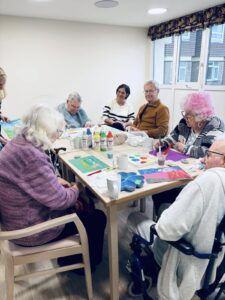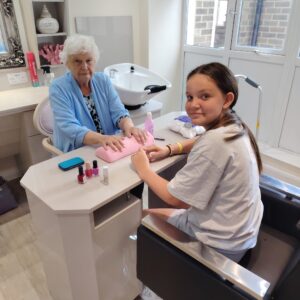Imagine you’re navigating a complex maze; this is often how families feel when deciphering the landscape of 24-hour home care. You’re seeking a beacon of light to guide you through the myriad of services essential for the well-being of your loved one.
From personal care assistance and medication management to companionship and mobility aid, the spectrum of services is broad. Yet, understanding the nuances of each service and how they intertwine to support day-to-day living can unlock a new level of care.
Let’s explore these pathways together, and uncover the core elements that make 24-hour home care a pivotal solution for many.
Key Takeaways
– 24-hour home care offers personal care assistance, including hygiene, grooming, and mobility support.
– It provides medication management to ensure timely administration and monitor interactions.
– Meal preparation services are tailored to dietary needs, promoting balanced nutrition.
– Companionship and emotional support are key components, enhancing mental well-being and safety.
Personal Care Assistance
Personal care assistance, a cornerstone service of 24-hour home care, ensures that your daily living needs are met with professionalism and compassion. This essential service encompasses various aspects of personal care, focusing on maintaining your dignity and promoting independence.
One of the key components is hygiene support, which includes assistance with bathing, toileting, and incontinence care. These tasks are handled with utmost sensitivity, ensuring you feel comfortable and respected.
Grooming help is another critical aspect of personal care assistance. This involves aid with hair care, oral hygiene, dressing, and nail care, tasks that might seem simple but can become challenging due to age, illness, or disability. Skilled caregivers are trained to assist with these daily routines, making sure you look and feel your best.
Moreover, personal care assistance extends to mobility support, helping you move safely around your home and preventing falls. Caregivers are also there to assist with transferring and positioning, ensuring you’re comfortable whether you’re sitting, lying down, or engaging in prescribed physical activities.
Medication Management
Ensuring your medications are correctly managed is another crucial service provided by 24-hour home care, aimed at maintaining your health and well-being. Professional caregivers are trained to handle your medication schedule, making sure you’re taking the right doses at the right times. This meticulous attention to your medication regimen can significantly reduce the risk of adverse drug interactions and ensure that your treatment progresses as intended.
Key aspects of medication management include:
– Timely administration of medications: Caregivers ensure that you take your medications exactly when you’re supposed to, preventing missed doses or accidental overdoses.
– Monitoring for side effects and drug interactions: They keep a vigilant eye on potential side effects or dangerous drug interactions, ensuring your safety and well-being.
– Assistance with prescription renewals: Caregivers can help with organising prescription renewals, ensuring you never run out of necessary medications.
Meal Preparation Services
Another essential service offered by 24-hour home care is meal preparation. This service ensures you receive nutritious meals tailored to your dietary needs and preferences. This aspect of care is pivotal, particularly for individuals who may face challenges in maintaining a balanced diet due to health conditions or mobility issues. Home care professionals are adept at navigating dietary restrictions, crafting meals that not only adhere to your specific health requirements but also cater to your taste buds.
They’re skilled in preparing a wide range of dishes, from heart-healthy options to meals designed for diabetic care or other specific health-related dietary needs. Furthermore, these caregivers can provide invaluable cooking lessons, empowering you with the knowledge and skills to make simple, healthy meals on your own, if you’re able. This educational component ensures that you’re not just passively receiving care but actively participating in maintaining your health and independence through nutrition.
Companionship and Emotional Support
Beyond physical care, 24-hour home care also offers the invaluable service of companionship and emotional support, addressing the psychological needs that are crucial for overall well-being. When you’re exploring options for yourself or a loved one, understanding the depth of emotional and social support provided can make a significant difference in the quality of life.
24-hour home care ensures that individuals aren’t only safe but also emotionally nurtured. This includes:
– Safety monitoring to ensure a secure environment, providing peace of mind for both the individual and their family.
– Consistent social interaction, which combats feelings of loneliness and isolation that many seniors experience. Caregivers are there to share meals, engage in conversations, and participate in favourite activities.
– Emotional support during challenging times, offering a listening ear, understanding, and empathy. This helps in building a trusting relationship, which is essential for mental health.
The companionship provided goes beyond mere physical presence. It’s about creating meaningful connections, understanding individual needs, and ensuring that every day is as fulfilling as possible. This aspect of care is vital, as it touches on the human need for connection, making 24-hour home care a comprehensive solution for overall wellness.
Mobility and Transportation Aid
In addressing the needs of individuals requiring 24-hour home care, mobility and transportation aid stand out as crucial services for maintaining independence and accessing essential amenities. You’ll find that these services focus on ensuring your mobility needs are met safely and effectively, whether you’re moving around your home or going out for appointments and social engagements.
Safety assessments play a pivotal role in this process. Caregivers or professionals conduct thorough evaluations of your living environment and mobility patterns to identify potential hazards and recommend modifications. These assessments ensure that your home is a safe haven, reducing the risk of falls and injuries.
Moreover, equipment recommendations are tailored to your specific needs. Depending on the assessment’s outcome, you might be advised to use walkers, wheelchairs, or other assistive devices to enhance your mobility. The goal is to equip you with the necessary tools to move freely and securely, both within and outside your home.
Transportation services, another critical aspect of mobility aid, ensure you’re not isolated. Whether it’s a trip to the doctor, a family gathering, or a leisure outing, having reliable transportation means you can maintain your social connections and access healthcare without compromising your safety or independence.
Frequently Asked Questions
How Does 24-Hour Home Care Adapt to the Changing Needs of Clients Over Time, Particularly for Those With Progressive Conditions?
24-hour home care adapts to your evolving needs through technology integration, ensuring you receive personalised care. They also foster community involvement, keeping you connected and supported as your condition changes, maintaining a high care standard.
What Are the Qualifications and Training Requirements for Caregivers Providing 24-Hour Home Care, Especially in Handling Emergencies?
You’ll find caregivers in 24-hour home care have specific certifications and rigorous training, focusing on emergency protocols to ensure they’re well-equipped to handle sudden crises, maintaining a high standard of care and safety.
How Does 24-Hour Home Care Ensure the Privacy and Dignity of Clients While Providing Round-The-Clock Services?
Imagine feeling vulnerable, yet in the hands of 24-hour home care, your privacy and dignity are safeguarded zealously. They uphold client autonomy and adhere to strict confidentiality protocols, ensuring your comfort and respect around the clock.
What Are the Financial Options and Assistance Programs Available for Families Considering 24-Hour Home Care for Their Loved Ones?
You’ll find various financial options for 24-hour home care, including tax benefits and insurance policies. It’s crucial to research and understand these aids to effectively manage costs while ensuring quality care for your loved ones.
How Is the Compatibility Between the Client and Caregiver Assessed and Managed in a 24-Hour Home Care Setting to Ensure a Harmonious Relationship?
To ensure a harmonious relationship in 24-hour home care, agencies assess compatibility through personality matching and cultural sensitivity. You’ll find they carefully consider preferences and backgrounds to match you with the ideal caregiver.
Conclusion
Imagine the sun setting, casting a golden hue across your living room, and there, by your side, is a compassionate caregiver from your 24-hour home care service.
They’ve been your hands in the kitchen, crafting nutritious meals, your guide through medication schedules, and a friend sharing stories and laughter.
As night falls, they’re the reassuring presence ensuring you’re safe and comfortable.
This comprehensive care, blending personal assistance, emotional support, and mobility aid, is the essence of 24-hour home care—your sanctuary of support, day and night.






